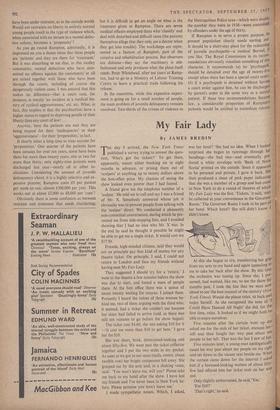My Fair Lady
By JAMES BREDIN THE day I arrived, the New York Times published a survey trying to answer the ques- tion, 'Who's got the tickets?' To get them, apparently, meant either booking six to eight months in advance, or prising them out of 'scalpers' at anything up to twenty dollars above the box-office price. My chances of seeing the show ,looked even poorer than I had feared.
A friend gave me the telephone number of a 'scalper.' He told me to call and say I was a friend of Mr. X. Somebody answered whose job it obviously was to prevent people from talking with the 'scalper' direct. We conducted a pleasantly non-committal conversation, during which he pre- vented me from side-stepping him, and I avoided showing that I had no idea who Mr. X was. In the end he said he thought it possible he might be able to get me a single ticket. It would cost me $17.50.
Friends, high-minded citizens, said they would not on principle pay that kind of money for any theatre ticket. On principle, I said, I could not return to London and face my friends without having seen My Fair Lady.
They suggested I should try for a 'return.' I. went'to the theatre a few minutes before the show was due to start, and found a mass of people there. At the box office there was a queue of about twenty waiting for returns. I joined them. Presently I heard the voices of three women be- hind me, two of them arguing with the third who, it seemed, had a ticket she couldn't use because her sister had failed to arrive (odd, as there was still ten minutes to go before the show began).
The ticket cost $4.60; she was asking $10 for it —'it cost me more than $10 to get here.' I gave her the $10.
She was short, brisk, determined-looking and about fifty-five. We went past the ticket collector together and I put the two stubs in my pocket. As soon as we got to our seats (stalls, centre, about twelfth row) her bright composure fell away. She grasped me by the arm and, in a shaking voice, said : 'You won't leave me, will you? Please take me back to My hotel after the show. I have lost my friends and I've never been in New York be- fore. Please promise you won't leave me.'
I made sympathetic noises. Which, I asked, was her hotel? She had no idea. When I looked surprised she began to rummage through her handbags—she had two—and eventually pro- duced a white envelope with 'Bank of No‘ Scotia' printed on the outside. Since it appeared to be personal and private, I gave it back. She then produced a sheet of pink paper indicating that she was a member of a group and had conic to New York to do a round, of theatres of which My Fair Lady was the first. 'Tickets,' it said, Ma Y be collected at your convenience in the Governor Room.' The Governor Room I took to be part Of her hotel. Which hotel? She still didn't know. I didn't know.
At this she began to cry, transferring her gri from my arm to my hand and again appealing 1 me to take her back after the show. By this time the orchestra was tuning up. Since she, I pre-''', sumed, had wanted, like me, to see the show for months past, I took the line that we were now about to see `the best musical of the century' (New York Times). Would she please relax, sit back and enjoy herself. As she recognised the tune of Could Have Danced All Night' she did, for the first time, relax. It looked as if we might both be able to enjoy ourselves.
Five minutes after the curtain went up she asked me for the stub of her ticket, excused he self and then fought her way past about ten people to her left. That was the last I saw of her. Five minutes later, a young man apologeticallY eased his way past about ten people on my right and sat down in the vacant seat beside Me. When the curtain came down for the interval I asked him if a harassed-looking woman of about fifty- five had offered him her ticket stub on her way out.
Only slightly embarrassed, he said, 'Yes.' 'For $10?'
'That's right,' he said.
































 Previous page
Previous page